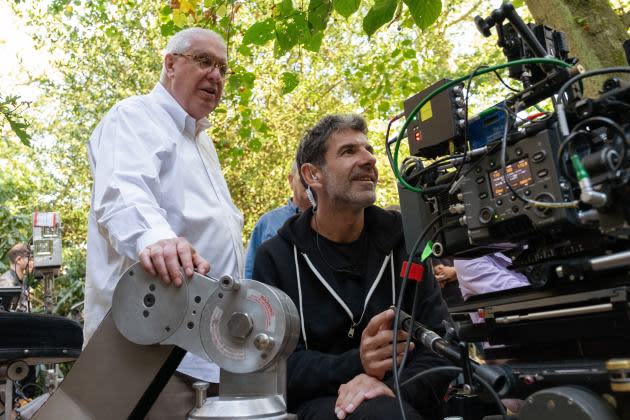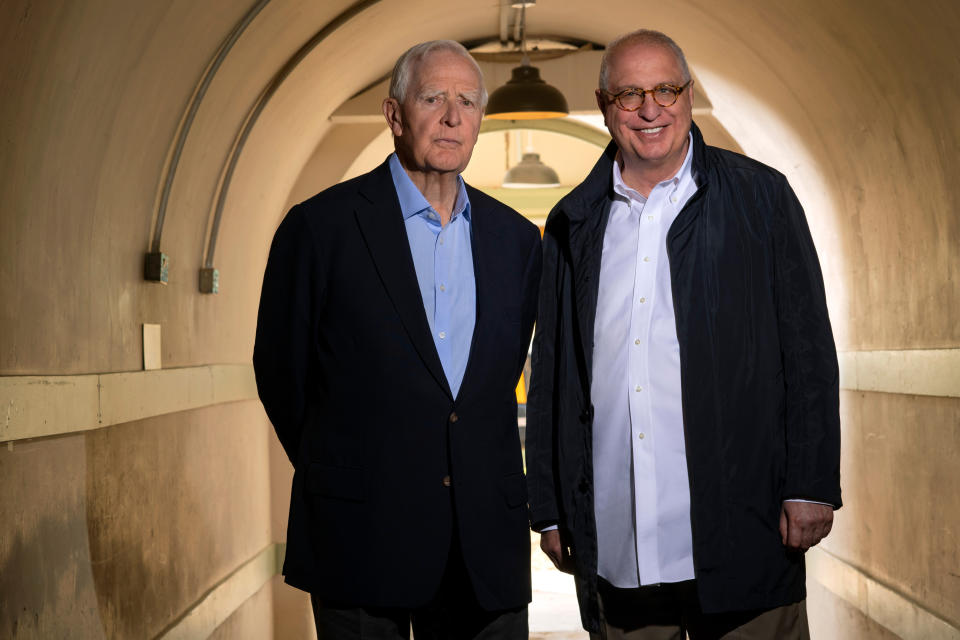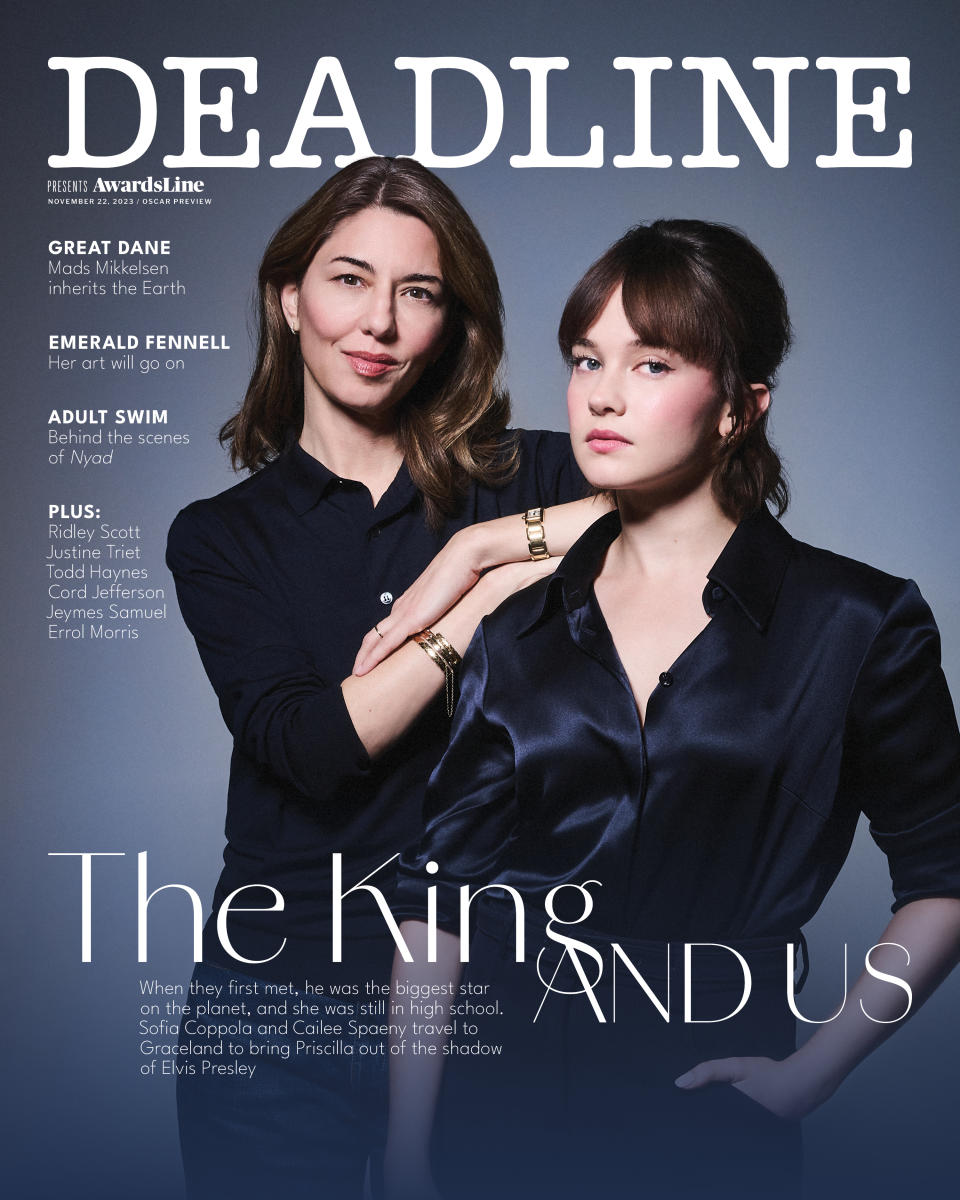‘The Pigeon Tunnel’ Director Errol Morris On The Suspicious Mind Of Spy-Turned-Novelist David Cornwell
- Oops!Something went wrong.Please try again later.
- Oops!Something went wrong.Please try again later.
- Oops!Something went wrong.Please try again later.

Documentary filmmaker Errol Morris had just begun his interview with David Cornwell for The Pigeon Tunnel when his subject — the former spy-turned-author better known by his pen name John le Carré — threw him a curveball. Or a left hook. Choose your metaphor. Cornwell eschewed the usual niceties reserved for such circumstances in favor of a riposte, demanding to know of his interlocutor, “Who are you?” Morris, the Oscar-winning director of The Fog of War, struggled to formulate a response. Maybe, he felt, at some philosophical level it was a question he truly couldn’t answer.
DEADLINE: What did you think of David Cornwell’s opening move with that question?
More from Deadline
ERROL MORRIS: When someone looks at you and says, “Who are you? Who are you?” My answer — I think it’s a fair answer — is I tell him, “I don’t think I can answer that question. Not because I don’t want to, but maybe I don’t know who I am.”
DEADLINE: He sought you out to do the documentary, and yet he also told you at the start of the interview that he had investigated you beforehand. I think if that were me, that would put me back on my heels, which perhaps is the intent behind him telling you that. But it certainly is revelatory about Cornwell, indicating a fundamental degree of suspicion about others, about whomever might be sitting across from him.
MORRIS: Such a strange way to begin an interview. He starts examining, unpacking, if you will, the difference between interrogations and interviews. Is there any difference? Well, I’m not sure. I remember being shocked during the interview and I have thought about it a great deal ever since. What exactly is the difference between an interrogation and an interview?
I’m always puzzled — I think that’s the right word — by descriptions of interviews as being some kind of contest, some kind of adversarial relationship. Even le Carré himself wants to define the process as some kind of interrogation. It’s not an interrogation. Honest to God, I’m not a cop. It’s not as if I think he’s hiding something from me and it’s my job to get him to confess. “OK, I’ll get it out of you, come clean!” It’s a completely different process. I believe it’s the process of creating a situation where people are talking to each other and, dare I say it, maybe even communicating. Can that happen?
DEADLINE: For the set of your interview, you created a background of mirrors, a bifurcated or split visual motif. Can you say what you were communicating by that?
MORRIS: I’m happy to try to explain — that is, if I myself understand what I’m doing, and I may not. His world is a fractured world. He tells us that again and again and again, and I wanted to find a way of mirroring that in the way that the film was shot. I’m always looking for new ways of doing things. Having this writer, a writer who talks endlessly about duplicity, betrayal, lying, is a way of forcing the images to double back on themselves, and I hope it works. One always hopes that what one’s doing makes sense ultimately, at least for some people.
DEADLINE: In the film, Cornwell suggests there’s an unknowability about every individual. His answer in the end is that he can identify himself as an artist. In other words, he can describe his identity by what he does, but not who he is, per se.
MORRIS: I agree. I’m fond of pointing out to myself and others that we think that because our brains, our minds, are sitting inside of our skulls, that we have privileged access to them. But I think I’m as unknowable to myself as I am to other people, and there’s some deep mystery about personality and identity, and part of the story of The Pigeon Tunnel is exploring that mystery.
David gives us fractured pieces of his autobiography, a lot about his father, less about his mother. He makes connections between his biography and the books that he produced. And there are, of course, connections to be made between the history that he experienced all around him in the books that he produced. But there is an inherent mystery about us as people. He tells us he didn’t ever want to be psychoanalyzed because he felt if he was psychoanalyzed, he would lose the ability to write. He couldn’t create his espionage novels. Whether this is true or not, I do not know, but it’s something that I believe was honestly expressed. Almost, “I’d like to know less about myself, but maybe I could find out something about myself by writing.”

DEADLINE: That moment you refer to, where he says he didn’t want to subject himself to psychoanalysis, he brings two fingers to his chin. I found this a fascinating gesture, gentle yet slightly guarded, self-protective.
MORRIS: I agree. I remember when he was doing that during the filming, he was driving me crazy. I thought, “Take your hands off your face, OK?”
DEADLINE: The title of the film comes from Cornwell’s memoir, The Pigeon Tunnel. It relates to a memory of his childhood, when he would accompany his father to Monte Carlo. His dad and these other men would fire on pigeons that were released from cages on the casino’s roof. The birds would scoot through a tunnel before being shot at. As a metaphor, what do you think the pigeon tunnel means?
MORRIS: It’s more than a metaphor. It is a metaphor for something, but a metaphor for what? It’s a parable, like a Kafka parable, that seems to suggest a lot of different meanings, but not one specific meaning. It’s certainly Sisyphean in the sense that you have these pigeons flying out from tunnels out over the Mediterranean being shot at by disgruntled gamblers. Some of them are killed, some of them are winged, some of them emerge unscathed and return to their coops and then repeat the whole circuit the following day. You could call it a metaphor for life, endlessly doing the same things until we drop dead… Sometimes even shot out of the sky.
DEADLINE: In some ways, the film is about conviction. We see when Cornwell was working for Britain’s MI6 — the foreign surveillance service — posted in Bonn in the early 1960s. Presumably, as an agent of the British government, he was acting in furtherance of a set of beliefs about the world. Yet, he becomes very disillusioned about what’s going on in Germany.
MORRIS: I look at movies as an opportunity to learn something, and I learned an enormous amount through making this movie, just listening to David talking about being in Germany. So, he has this dual role. He’s this ostensible civil servant, but he’s also working as a spy. And he looks around him and in the [West German] government, in the Bundesrepublik there, there are all these Nazis, call them ex-Nazis, whatever you want to call them. But there are all these people who had positions in the Third Reich. And he says to himself, “Didn’t we fight a war about this? Wasn’t there this so-called World War II? And now the guy who was part of defining the Holocaust is second-in-command in the new German Republic. What is that about?” He taught me — maybe I knew it in some form already — but he certainly taught me very powerfully that history is not about remembering. History is about forgetting, and sometimes to use his language, “enforced forgetting”.
When he was a student at Oxford, Cornwell joined a Communist student organization and he [later] betrayed his fellow students. He wrote down names, identified them as Communist sympathizers. And I ask him in the film, “Do you regret doing that? Do you regret, I suppose on some level, betraying your fellow students? ” And he says, “No.” Basically, they’re on the wrong side of history. They’re committed to Stalin, and for David, they’re committed to evil.
One of the things that really fascinated me about him [was that], despite all of these stories about moral ambiguity, I felt very keenly in this man that he had a sense of good and evil, of right and wrong, and he was unbudging about it.
There’s right and wrong in history, who’s good and evil in history. He was a person of really strong convictions. I knew him in the last years of his life, totally opposed to Brexit, totally disappointed with his government in Britain. He actually believed in queen and country. I’d often say to myself, here’s a man far less cynical than I am. What a surprise.

DEADLINE: There is perhaps some overlap between you and Cornwell in your absurdist view of history.
MORRIS: I was just thinking earlier today, I had done a film with a Kennedy assassination investigator, ‘Tink’ Thompson, talking about the ‘umbrella man’ and how the presence of a man holding an umbrella in Dealey Plaza, right at the time of the assassination, had to be a clue to some underlying conspiracy, but maybe it wasn’t. Maybe it was just some absurd accidental detail in history. I mean, in principle, all mysteries should be solvable if we work hard enough. If we search long enough, we should be able to come up with the goods that allow us to put the jigsaw puzzle together. But there are often pieces missing or they have been adulterated in some unspeakable way. What I like about my own movie, if I can be so bold, is it starts off talking about string-pullers and dupes. It’s the spy version of history. There are people who either are tricking people or are tricked by people. And by the end of the movie, it’s something much closer to my way of seeing the world. It’s chaos. I have this very simple argument against conspiracies: just look at the people around. They’re too confused, too much at cross purposes with each other to actually ever effectively conspire to do anything. It’s hard enough to agree with a group of people on where to have lunch. And if anything, history is a madhouse. Look at what’s going on in the world today. I don’t see conspiracies. I see just garden variety, human insanity.
Best of Deadline
2023 Premiere Dates For New & Returning Series On Broadcast, Cable & Streaming
Danielle Brooks To Receive Palm Springs Film Festival's Spotlight Award, Actress
Sign up for Deadline's Newsletter. For the latest news, follow us on Facebook, Twitter, and Instagram.

